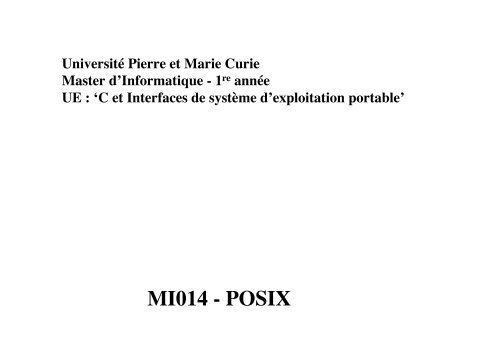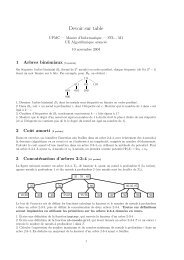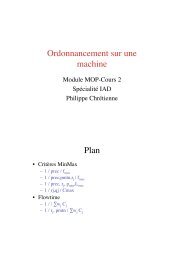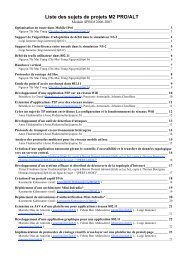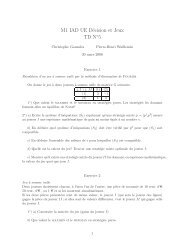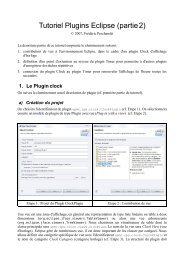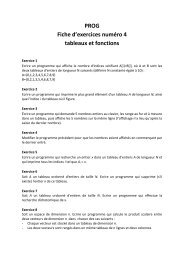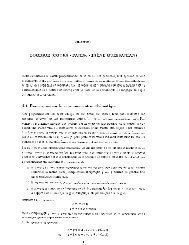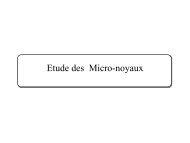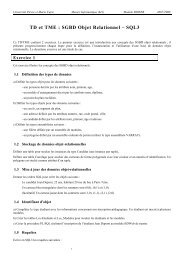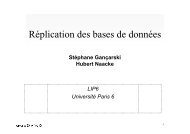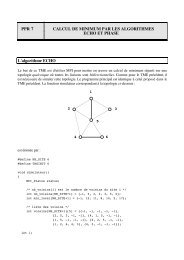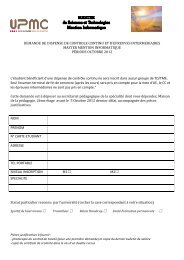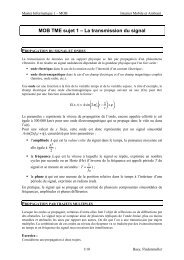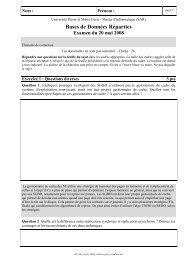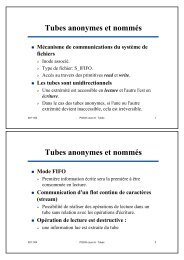mi014 - posix - Master informatique - Université Pierre et Marie CURIE
mi014 - posix - Master informatique - Université Pierre et Marie CURIE
mi014 - posix - Master informatique - Université Pierre et Marie CURIE
You also want an ePaper? Increase the reach of your titles
YUMPU automatically turns print PDFs into web optimized ePapers that Google loves.
Université <strong>Pierre</strong> <strong>et</strong> <strong>Marie</strong> Curie<br />
<strong>Master</strong> d’Informatique - 1 re année<br />
UE : ‘C <strong>et</strong> Interfaces de système d’exploitation portable’<br />
MI014 - POSIX
Supports de Cours<br />
(Document n° 1 - Cours 1 à 6)<br />
Luciana ARANTES-BEZERRA<br />
Olivier MARIN<br />
Responsable : Professeur Bertil FOLLIOT<br />
Année : 2006 - 2007 (27/09/06)
Équipe Pédagogique<br />
• Luciana Arantes (Cours)<br />
luciana.arantes@lip6.fr<br />
• Bertil Folliot (Responsable + TME)<br />
bertil.folliot@lip6.fr<br />
• Gérard Nowak (TME)<br />
gerard.nowak@lip6.fr<br />
• Olivier Marin (Cours + TME)<br />
olivier.marin@lip6.fr<br />
• <strong>Pierre</strong> Sens (TME)<br />
pierre.sens@lip6.fr<br />
3
Organisation Administrative<br />
Horaires<br />
Cours (amphithéâtre B2)<br />
lundi 8h30 - 10h30<br />
TME (bâtiment 31)<br />
Groupe 1 : lundi 16h-18h, 18h30-20h30 (312)<br />
Groupe 2 : lundi 16h-18h, 18h30-20h30 (309)<br />
Groupe 3 : mercredi 8h30-10h30, 11h-13h (304)<br />
Groupe 4 : jeudi 13h30-15h30, 16h-18h (312)<br />
4
Organisation Administrative<br />
• Valeur ECTS : 6<br />
• Note finale<br />
CC 40%<br />
partiel 30%<br />
TME 10%<br />
Examen 60%<br />
• Autres informations<br />
http://www.infop6.jussieu.fr/lmd/master/ue/<strong>posix</strong>/<br />
5
Plan de Cours<br />
• Cours 1 : Introduction<br />
• Cours 2 : Vie <strong>et</strong> mort des processus<br />
• Cours 3 : Gestion des signaux<br />
• Cours 4 : Tubes<br />
• Cours 5 & 6 : Entrées / Sorties<br />
• Cours 7 & 8 : IPC<br />
• Cours 9 & 10 : Threads<br />
6
Cours 1 : Introduction<br />
– Définir C / POSIX<br />
– La Norme POSIX<br />
– Rappels<br />
Makefile<br />
Environnement de programmation<br />
– Bibliographie<br />
7
Définir C / POSIX<br />
ou Pourquoi POSIX ?<br />
8
Définir C / POSIX<br />
• Langage C : une première définition<br />
"Un langage :<br />
• structuré,<br />
• généralement compilé,<br />
• de *haut* niveau"<br />
9
Définir C / POSIX<br />
• Langage C : les origines<br />
Travaux de Ken Thompson, Dennis Ritchie, Brian Kernighan<br />
– Proj<strong>et</strong> d'OS basé sur Multics<br />
accès simple aux périphériques<br />
multi-utilisateurs<br />
code utilisateur indépendant du hardware, i.e. portable<br />
– Résultat : UNIX<br />
Noyau + Compilateur C : Bibliothèque "standard"<br />
10
Définir C / POSIX<br />
• Langage C : définition enrichie<br />
"Un langage de programmation dont la structure est<br />
proche de la machine de von Neumann."<br />
Bibliothèque "standard"<br />
Strict minimum pour interagir avec la machine<br />
ex.: manipulation texte/fichiers, gestion mémoire, mesure du temps de calcul<br />
Tout le reste :<br />
• à la charge du programmeur,<br />
• bibliothèques système spécifiques (souris, écran, percolateur, ...)<br />
11
Définir C / POSIX<br />
• Langage C : généalogie<br />
CPL/BCPL<br />
B<br />
NB<br />
C<br />
Travaux MIT, Londres, Cambridge<br />
Non typé<br />
Adaptation pour Unics, Thompson, 1969-1972<br />
Introduction du typage<br />
Adaptation pour Unix, Ritchie, 1972-1973<br />
Générateur de code pour NB<br />
Ajout de fonctionnalités :<br />
structures, unions, énumérations<br />
définition de type, changement de type (cast)<br />
12
Définir C / POSIX<br />
• UNIX : grandeur <strong>et</strong> décadence<br />
Succès entraîne une multiplication des versions<br />
UNIX Wars : Berkeley, AT&T, OSF, Novell, X/Open, ...<br />
Chacune se voit comme LE standard<br />
⇒ Brouillage de la notion de standard, fin de la portabilité...<br />
• R<strong>et</strong>our à la raison : normalisation<br />
POSIX : norme ISO "non propriétaire"<br />
comités indépendants, représentatifs d'un grand nombre de parties<br />
adoptée par les organismes gouvernementaux, i.e. le ZE client<br />
13
La Norme POSIX<br />
14
La Norme POSIX<br />
POSIX : principe<br />
Portable Operating System Interface for Computing Environments<br />
Document de travail<br />
Produit par IEEE<br />
Endossé par ANSI <strong>et</strong> ISO<br />
Application<br />
API standard pour applications<br />
Définitions de services : librairies d'un OS virtuel normalisé<br />
définition du comportement attendu lors d'un appel de service<br />
Portabilité *garantie* pour les codes sources applicatifs qui l'utilisent<br />
contrat application / implémentation (système)<br />
Interface Applications<br />
Librairie<br />
OS<br />
Interface OS<br />
15
La Norme POSIX<br />
POSIX : En fait, un ensemble de standards (IEEE 1003.x)<br />
Chaque standard se spécialise dans un domaine<br />
Entre autres :<br />
1003.1 (POSIX.1) System Application Program Interface (kernel)<br />
1003.2 Shell and Utilities<br />
1003.4 (POSIX.4) Real-time Extensions<br />
1003.7 System Administration<br />
Divisé en sections, 2 catégories de contenu :<br />
• Bla-bla (Préambule, Terminologie, Contraintes, ...)<br />
• Regroupements de services par thème<br />
Pour chaque service, une définition d'interface<br />
(Synopsis, Description, Examples, R<strong>et</strong>urns, Errors, References)<br />
16
La Norme POSIX<br />
Sections du standard POSIX.1<br />
1. General (Scope, Normative References, Conformance)<br />
2. Terminology and General Requirements (Conventions, Definitions, General<br />
Concepts, Error Numbers, Primitive System Data Types, Environment Description,<br />
C Language Definitions, Numerical Limits, Symbolic Constants)<br />
3. Process Primitives (Process Creation and Execution, Process Termination, Signals,<br />
Timer Operations)<br />
4. Process Environment (Process Identification, User Identification, Process Groups,<br />
System Identification, Time, Environment Variables, Terminal Identification,<br />
Configurable System Variables)<br />
5. Files and Directories (Directories, Working Directory, General File Creation,<br />
Special File Creation, File Removal, File Characteristics, Configurable Pathname,<br />
Variables)<br />
17
La Norme POSIX<br />
Sections du standard POSIX.1 (suite)<br />
6. Input and Output Primitives (Pipes, File Descriptor Manipulation, File Descriptor<br />
Deassignment, Input and Output, Control Operations on Files)<br />
7. Device- and Class-Specific Functions (General Terminal Interface, General<br />
Terminal Interface Control Functions)<br />
8. Language-Specific Services for the C-Programming Language (Referenced C<br />
Language Routines, C Language Input/Output Functions, Other C Language<br />
Functions)<br />
9. System Databases (System Databases, Database Access)<br />
10. Data Interchange Format (Archive/Interchange File Format)<br />
18
La Norme POSIX<br />
Conventions typographiques (cf. POSIX.1 - Section 2.1)<br />
italic<br />
bold<br />
Courier<br />
[ENOENT]<br />
{PATH_MAX}<br />
cross references, symbolic param<strong>et</strong>ers, data types,<br />
function names, global external variable names<br />
environment variable names (majuscules), NULL pointer<br />
data types, function names (Synopsis), examples of<br />
system input or output, utility names, headers<br />
symbolic constants (error numbers)<br />
symbolic constants (limits)<br />
19
La Norme POSIX<br />
Exemple de définition d'interface<br />
NAME<br />
g<strong>et</strong>pid - g<strong>et</strong> the process ID<br />
SYNOPSIS<br />
#include <br />
pid_t g<strong>et</strong>pid(void);<br />
DESCRIPTION<br />
The g<strong>et</strong>pid() function shall r<strong>et</strong>urn the process ID of the calling process.<br />
RETURN VALUE<br />
The g<strong>et</strong>pid() function shall always be successful and no r<strong>et</strong>urn value is reserved to<br />
indicate an error.<br />
ERRORS<br />
No errors are defined.<br />
EXAMPLES<br />
None.<br />
SEE ALSO<br />
exec(), fork(), g<strong>et</strong>pgrp(), g<strong>et</strong>ppid(), kill(), s<strong>et</strong>pgid(), s<strong>et</strong>sid(), the Base Definitions<br />
volume of IEEE Std 1003.1-2001, , <br />
IEEE Std 1003.1, 2004 Edition Copyright © 2001-2004 The IEEE and The Open Group, All Rights reserved.<br />
20
Rappels<br />
Compilation<br />
21
Rappels : Compilation<br />
Exécution d'un programme C : Traducteurs<br />
1. préprocesseur C (cpp)<br />
substitutions textuelles : constante, macro fonctions, commentaires,<br />
inclusion de fichiers, compilation conditionnelle<br />
2. compilateur C (cc1)<br />
phases : analyses, génération, optimisation<br />
3. assembleur (as)<br />
4. éditeur de liens (ld)<br />
5. gérant de bibliothèques (ar : ARchiver)<br />
6. interpréteur (bash, …)<br />
7. noyau OS<br />
Unix : gérant de processus, gérant mémoire, …<br />
8. outils d’aide à la mise au point (gdb <strong>et</strong> fichier de nom ‘core’, trace, …)<br />
gcc<br />
22
Rappels : Compilation<br />
Quelques extensions de noms de fichiers<br />
.c<br />
.i<br />
.h<br />
.s, .S<br />
.o, .so<br />
.a, .sa<br />
Source C<br />
Source C prétraité<br />
Fichier préprocesseur (h = header)<br />
Source Assembleur<br />
Fichier obj<strong>et</strong> partagé<br />
Fichier archive (bibliothèque) partagé(e)<br />
23
Rappels : Compilation<br />
_____ _____ _____<br />
_____ _____ _____<br />
_____ _____ _____<br />
*.h<br />
#define ... (macros)<br />
#include ... (headers)<br />
int main(...) {<br />
....<br />
}<br />
main.c<br />
exec<br />
Linker<br />
Compiler<br />
∆<br />
+<br />
O<br />
main compilé<br />
Bibliothèques<br />
24
Rappels : Compilation<br />
Quelques maillons de la chaîne de développement<br />
1. Génération d'exécutable<br />
cpp cc1 as ld<br />
*.c ou *.h *.c ou *.i *.s *.o ou *.so<br />
2. Génération <strong>et</strong> indexation de bibliothèque<br />
3. Edition de liens<br />
*.o ou *.so ou *.a ou *.sa<br />
*.o<br />
*.so<br />
ld<br />
gcc<br />
ar<br />
*.a<br />
*.sa<br />
ranlib<br />
a.out<br />
ou autre<br />
*.o ou *.so<br />
ou a.out ou autre nom d'exécutable<br />
25
Rappels : Compilation<br />
Quelques options de gcc<br />
-ansi<br />
-Wall (Warning)<br />
-c (cpp + cc1 + as)<br />
-g<br />
-D (Define)<br />
-M (Make)<br />
-H (Header)<br />
-I (Include)<br />
-L (Library)<br />
-l (library)<br />
Assurer le respect du standard ANSI<br />
Afficher tous les avertissements générés<br />
Om<strong>et</strong>tre l'édition de liens<br />
Produire des informations de déboguage<br />
Définir une macro<br />
Générer une description des dépendances de chaque fichier obj<strong>et</strong><br />
Afficher le nom de chaque fichier header utilisé<br />
Etendre le chemin de recherche des fichiers headers (/usr/include)<br />
Etendre le chemin de recherche des bibliothèques (/usr/lib)<br />
Utiliser une bibliothèque (lib.a)<br />
durant l'édition de liens<br />
-o (Output)<br />
Rediriger l'output dans un fichier<br />
26
Rappels : Compilation<br />
Exemple : proj<strong>et</strong> "HelloWorld"<br />
_____<br />
_____<br />
_____<br />
hello.c<br />
_____<br />
_____<br />
_____<br />
hello.h<br />
_____<br />
_____<br />
_____<br />
main.c<br />
27
Rappels : Compilation<br />
Exemple : fichier 'hello.c'<br />
#include <br />
#include <br />
void Hello(void){<br />
}<br />
printf("Hello World\n");<br />
28
Rappels : Compilation<br />
Exemple : fichier 'hello.h'<br />
#ifndef H_GL_HELLO<br />
#define H_GL_HELLO<br />
void Hello(void);<br />
#endif<br />
29
Rappels : Compilation<br />
Exemple : fichier 'main.c'<br />
#define _POSIX_SOURCE 1<br />
#include <br />
#include <br />
#include "hello.h"<br />
int main(void){<br />
Hello();<br />
r<strong>et</strong>urn EXIT_SUCCESS;<br />
}<br />
30
Rappels : Compilation<br />
Exemple : proj<strong>et</strong> "HelloWorld" - dépendances<br />
_____<br />
_____<br />
_____<br />
hello.c<br />
_____<br />
_____<br />
_____<br />
hello.h<br />
_____<br />
_____<br />
_____<br />
main.c<br />
∆<br />
+<br />
O<br />
hello.o<br />
∆<br />
+<br />
O<br />
main.o<br />
hello<br />
31
Rappels : Compilation<br />
Fichier Makefile (ou makefile)<br />
Constitué de plusieurs règles de la forme<br />
: <br />
<br />
NB : chaque commande est précédée d'une tabulation<br />
Prérequis<br />
Le fichier est-il présent ?<br />
La règle est-elle vérifiée ?<br />
Evaluation d'une règle en 2 étapes<br />
1. Analyse des prérequis (processus récursif)<br />
2. Exécution des commandes<br />
32
Rappels : Compilation<br />
Exemple "HelloWorld" : fichier 'makefile' minimal<br />
hello: hello.o main.o<br />
gcc -o hello hello.o main.o<br />
hello.o: hello.c<br />
gcc -o hello.o -c hello.c -Wall -ansi<br />
main.o: main.c hello.h<br />
gcc -o main.o -c main.c -Wall -ansi<br />
33
Rappels : Compilation<br />
Exemple "HelloWorld" : fichier 'makefile' enrichi - règles complémentaires<br />
all: hello<br />
hello: hello.o main.o<br />
gcc -o hello hello.o main.o<br />
hello.o: hello.c<br />
gcc -o hello.o -c hello.c -Wall -ansi<br />
main.o: main.c hello.h<br />
gcc -o main.o -c main.c -Wall -ansi<br />
clean:<br />
rm -rf *.o hello<br />
34
Rappels : Compilation<br />
Exemple "HelloWorld" : fichier 'makefile' enrichi - variables personnalisées<br />
CC=gcc<br />
CFLAGS=-Wall -ansi<br />
EXEC=hello<br />
all: $(EXEC)<br />
hello: hello.o main.o<br />
$(CC) -o hello hello.o main.o<br />
hello.o: hello.c<br />
$(CC) -o hello.o -c hello.c $(CFLAGS)<br />
main.o: main.c hello.h<br />
$(CC) -o main.o -c main.c $(CFLAGS)<br />
clean:<br />
rm -rf *.o $(EXEC)<br />
35
Rappels : Compilation<br />
Exemple "HelloWorld" : fichier 'makefile' enrichi - variables internes<br />
CC=gcc<br />
CFLAGS=-Wall -ansi<br />
EXEC=hello<br />
all: $(EXEC)<br />
hello: hello.o main.o<br />
$(CC) -o $@ $^<br />
hello.o: hello.c<br />
$(CC) -o $@ -c $< $(CFLAGS)<br />
main.o: main.c hello.h<br />
$(CC) -o $@ -c $< $(CFLAGS)<br />
clean:<br />
rm -rf *.o $(EXEC)<br />
$@<br />
$^<br />
$<<br />
targ<strong>et</strong> name<br />
list of dependencies<br />
name of 1st dependency<br />
36
Rappels<br />
Environnement de programmation<br />
37
Rappels : Environnement de<br />
Programmation<br />
Récupération d'arguments<br />
Ligne de commande : <br />
ex. : > myprog toto /usr/local 12<br />
Copiée par l'OS dans une zone mémoire accessible au processus<br />
En C, récupération au niveau du main<br />
main(int argc, char* argv[])<br />
argc<br />
argv<br />
nombre d'arguments (nom du programme inclus)<br />
tableau d'arguments (argv[0] = nom du programme)<br />
ex. : argc 4<br />
argv[0] "myprog"<br />
argv[3] "12"<br />
38
Rappels : Environnement de<br />
Programmation<br />
Récupération des variables d'environnement<br />
Environnement d'un processus :<br />
ensemble d'informations indispensables à son exécution<br />
ex. : PATH emplacement des exécutables<br />
PRINTER identifiant de l' imprimante par défaut<br />
En C, accessibles à partir du main<br />
main(int argc, char *argv[], char **env)<br />
env[i] couple "="<br />
ex. : "PRINTER=rocky.lip6.fr"<br />
dernier élément du tableau : NULL<br />
Voir aussi les fonctions s<strong>et</strong>env <strong>et</strong> g<strong>et</strong>env (stdlib)<br />
! Environnement hérité du père ⇒<br />
modifications n'affectent que le processus <strong>et</strong> sa descendance<br />
39
Flux standards<br />
Rappels : Environnement de<br />
Programmation<br />
Notion de flux standards déjà ouverts<br />
stdin entrée standard (par défaut : clavier)<br />
stdout sortie standard (par défaut : écran terminal)<br />
stderr sortie erreur (par défaut : écran terminal)<br />
Redirection en ligne de commande<br />
< redirection stdin<br />
> (ou 1>) redirection stdout<br />
2> redirection stderr<br />
ex. : myprog < myinputfile > results/myresults 2> errors/myerrors<br />
Entrées <strong>et</strong> sorties non standards (cf. cours 5 & 6)<br />
40
Rappels : Environnement de<br />
Programmation<br />
Numéros d'erreur (Error Numbers _ cf. POSIX.1 - Section 2.4)<br />
Chaque appel de fonction peut (ou non) générer un numéro d'erreur (> 0)<br />
Récupéré dans la variable externe errno<br />
Conservé jusqu'au prochain appel<br />
Constantes symboliques définies dans le standard<br />
ex. : [EACCES], [ECHILD], [EEXIST], [EINVAL]<br />
D'autres peuvent être définies dans le système<br />
41
Bibliographie<br />
• Le langage C (C Ansi)<br />
Brian Kernighan, Dennis Ritchie, Masson Prentice Hall, 1991, 280 p.<br />
• International Standard ISO/IEC 9945-1, IEEE Std 1003-1<br />
IEEE Standards Department, 07/12/1990, 356 p.<br />
• POSIX Programmer's Guide (POSIX.1)<br />
Donald Lewine, O'Reilly & Associates, Inc., 1994, 609 p.<br />
• POSIX.4.<br />
Bill Gallmeister, O'Reilly & Associates, Inc., 1995, 566 p.<br />
• Programmer avec les outils GNU<br />
O'Reilly & Associates, Inc., 1997, 265 p.<br />
• Méthodologie de la programmation en C, Bibliothèque standard, API POSIX<br />
J.-P. Braquelaire, Dunod, 3 e éd., Paris 2000, 556 p.<br />
42


